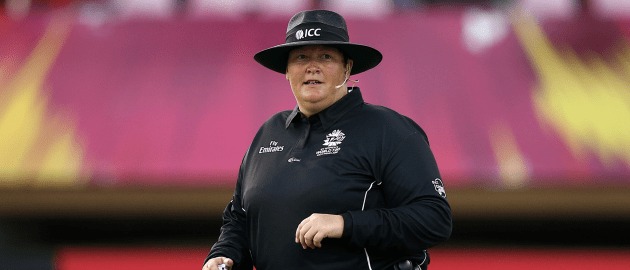
England’s Sue Redfern scripted history last month. She became the first ICC-appointed neutral umpire to do duty in a women’s bilateral series — between Australia and South Africa. In an interview with RevSportz, the former England international with six Test and 15 ODI caps spoke about the experience and the challenges. The following are the excerpts:
Q: How unique is the feeling of becoming the first ICC-appointed neutral umpire in women’s bilateral international cricket?
A: I feel honoured to become the first to be a neutral umpire. Initially, it was daunting being the only non-Australian in the officiating team and fitting into their routines and processes (albeit very similar). It also gave the perception of people expecting me to not make errors, as somehow you are seen as the different official. I was quickly made to feel at home. It was a great experience to learn from my colleagues — some ideas I can take back to my home board and implement in my own officiating.
Q: How different is it from becoming the first woman to officiate a men’s first-class game in England?
A: Very different. Making my first-class debut was about being in a different match environment. For this series in Australia — I was familiar with the match environment — it was women’s international cricket with DRS. Both assignments presented different challenges. Within the men’s game, I am not really known by the players and I have to work hard on the prep about players and the rapport with them. The challenges in the recent series were working alongside a team of colleagues from one country who have their own processes in place. Also, the actual game play with women’s cricket differs from men’s and sometimes you are busier in the women’s game with decision making.
Q: How would you describe the ICC’s role vis-a-vis this decision in broadening the horizon for women’s cricket in general?
A: The ICC has a huge part to play in increasing growth and challenging perceptions in world cricket for women and girls. Having a women’s bilateral series on the same footing as men’s cricket, in the decision to have neutral umpires, makes a huge statement showing that this is elite sport and the game should be treated with equality. For officials and potential future officials, it provides a visibility platform to show that officials can be any gender and can also be leaders in the game.
Q: Do you think this will pave the way for an Elite Panel of women umpires for international cricket?
A: I don’t know what the right model would be moving forward, but the most important element is to ensure women’s cricket across the world has access to the most competent and experienced officials. Having officials who regularly officiate within the women’s game and understand the nuances of the women’s game is important when considering an umpire’s performance. It is also recognising that there is still work to do globally, to attract more female officials and to provide a robust pathway to help develop and improve officiating and bring more females in this role.
Q: How far are we from seeing a woman being the umpire in a men’s international game?
A: It is already great to see some leading female umpires undertake international on-field appointments in the men’s game. The critical balance is to ensure when deciding to appoint, there is evidence to support that appointment, not just doing it to tick a box. The appointments so far have shown the robust approach to ensure performance can be achieved. Moving forward, if an umpire of any gender is performing in that particular playing environment, they should be given that opportunity. I am sure there will be more such appointments in the future.
Q: What drew you towards umpiring? Was it a continuation of you being an international cricketer yourself?
A: When I decided to become an umpire, it was me reminiscing as a player and what I wanted from an umpire — fair and honest, a good communicator, and someone who has empathy and understanding for the game. Playing internationally and playing for over 25 years gave me some of the skills, but experience in officiating is just as important. When you umpire, your focus areas are different. Initially, player experience helped but then hindered me. I thought as a player too much.
Q: What will be your advice for aspiring woman umpires? Do they have something to look forward to and have a career in umpiring?
A: The game is becoming more inclusive, but there is work to do. My main advice to women who want to become an umpire is to stay confident and don’t think you are an imposter. You have as much right to be doing the role as any other person. Learn from colleagues (male/female) and ask questions, don’t be shy. The biggest thing umpiring has given me is resilience. You will make mistakes, but you will become more comfortable with the uncomfortable, and you will learn from those mistakes.
Also Read: From streets to practice arenas: Raj Limbani’s passion has many playing grounds
Also Read: Returning Rishabh Pant Could be India’s Trump Card in Australia
Source link
credite
